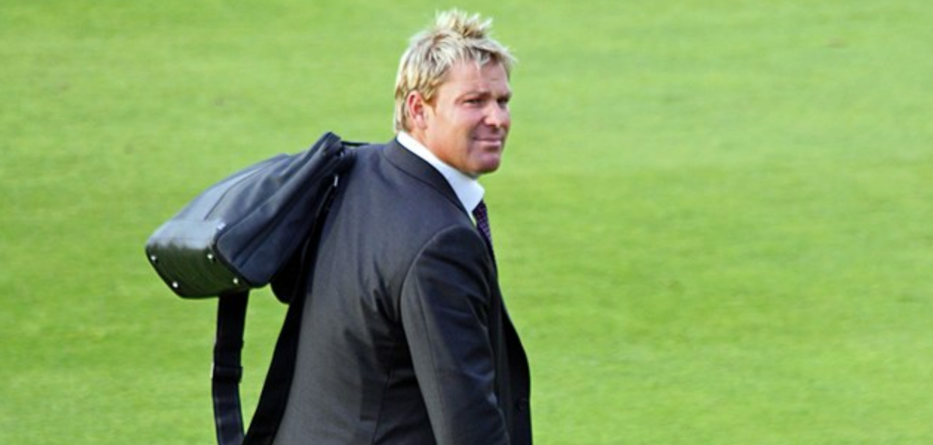It was once said of T. E. Lawrence that he had a tendency to back into the limelight. With the late Shane Warne, arguably the finest slow bowler cricket has ever produced, it edged towards him. His debut appearance against India in the 1991-2 home series in Australia was not auspicious. Paunchy, exuding a vernacular Australian coarseness, and initially wayward, he received an object lesson from India’s Ravi Shastri and the youthful Sachin Tendulkar at the Sydney Cricket Ground. But there were already those incipient signs: the slovenly look, the ear piercings, the peroxide hair.
Then came the tour of New Zealand — ominous signals for opposing cricket teams. Against the West Indies on home soil, Warne proved memorable. Then the Ashes in England, and the ‘ball of the century’ to Mike Gatting at Old Trafford. Leg spin bowling had come into vogue again, having been previously eclipsed by the cricket world’s gluttonous diet of pace through the 1980s. Warne bestrode the fields with an action sweetly described by Gideon Haigh as ‘both dainty and menacing, like Ernst Blofeld stroking his white cat.’
From then, Warne became the luminous cricketer, and more than that, the celebrity sportsman recognised for exploits on and off the field. As veteran ABC cricket commentator Jim Maxwell described it, ‘He brought some gamesmanship, some showmanship to the centre of the ground that we hadn’t seen before and he backed it up with enormous skill.’ Former Pakistani player Shahid Afridi, himself no slouch at wrist spinning, eloquently dubbed Warne ‘a university of leg-spin bowling’.
Ironically enough, Warne was so fiendishly good at the craft he did not seem to be consciously practising it. Paradoxically, he seemed elsewhere from the game, sublimely distracted even as he was executing it. Some forget that his first passion was for Australian Rules Football. In 1989, he was disabused of any professional prospects when he received a dismissive note from St Kilda Football Club after his final trial. David Runciman remarks on this point with edgy accuracy: ‘the mystery balls, the tricksy fields, the elaborate appeals — was just window-dressing.’
Similar to such mercurial figures as England’s Ian Botham, the press appended themselves like limpets to his every move. They detected and punished indiscretions, made copy on breaches of protocol. Cricketing authorities, while tolerating his seemingly limitless talent, ensured that this errant figure would never captain Australia.
‘The multitude of mistakes and misjudgements, which somehow made him even more appealing rather than a figure of excoriation, did not prevent him from engaging in good works.’
Away from the cricket pitch, Warne could be remarkably naïve and injudicious. Being in the limelight had the effect of resisting maturity and finding the means to be unapologetic. It all prompted him to remark that just because he did stupid things, did not make him a stupid man. Remarkably, as Andy Bull reflects, ‘There was an honesty to it all, and that made it hard to hold any of it against him for long.’
In No Spin, one of three ghost written autobiographies, Warne confessed that he had ‘made a number of mistakes in my life and I will continue to make them. This is what it means to be human.’ And particularly human he must have been, given the succession of mistakes. These included a bookmaker’s ‘gift’ of US$5000 in 1994 during a one-day tournament in Sri Lanka. His teammate Mark Waugh blotted his own copybook by receiving money from the same shady figure for supplying details about weather and the state of the pitch.
Things did come perilously close to ending Warne’s career. On one occasion, Pakistani cricketer Saleem Malik tried to entice him to throw a match for the sum of US$200,000. Warne claims that he, despite being interested in the money, was hardly going to accept it from Malik. ‘So I’ve gotta say no.’ (The recent glossy documentary Shane makes his rejection more purple coloured.)
Then came the infamous diuretic episode, with its unfathomable foolishness. The story goes that Warne’s mother supplied the cricketer with a diuretic ‘because she said I had a few extra chins.’ He remains indifferent to what was in it. ‘Stupid,’ he reflects, ‘but innocent.’ For that, he was banned from cricket in 2003 for a year.
For Warne, life was not to be lived quietly. Women featured heavily, and publicly, including his long-suffering wife Simone and the English actress and model, Elizabeth Hurley. Tabloids exploited that weakness, most notably the Rupert Murdoch rag, the News of the World.
There was much celebrity carousing, entertainment, the dance on the table, the all-night bender; chances to get into hot water. An anti-foodie if only because food — good food, that is — takes time. ‘I reckon sitting in a restaurant is a waste of time, the same as cooking … Food gets in the way of a good time.’ In Runciman’s words, ‘Warne is all about the atmosphere and the vibe.’
The multitude of mistakes and misjudgements, which somehow made him even more appealing rather than a figure of excoriation, did not prevent him from engaging in good works. Despite already being hailed as a demigod on the subcontinent, he won plaudits as the inspirational captain and coach of Rajasthan Royals in the opening year of the Indian Premier League (IPL) in 2008. He identified local talent and nurtured it.
He also moved into the world of charity, establishing the Shane Warne Foundation in 2004 to raise funds for ill and underprivileged children through holding poker nights and gala events. But even here, the serpent of controversy followed. Claims of financial mismanagement were made, suggesting that the Foundation had withheld charitable funds. Consumer Affairs Victoria, after uncovering financial anomalies, sought an independent audit. In 2016, Warne terminated the foundation. Yet another one of those mistakes.
Some of Warne’s last public words were, fittingly, in tribute to another cricketer of Australia’s pantheon, former wicketkeeper Rod Marsh. ‘Rod cared deeply about cricket & gave so much — especially to Australia & England players.’ While Warne evidently felt deeply about the game, if for no other reason it came with divine ease to him, his sense of celebrity and audacious risk taking suggested a bigger canvass: that of the admired flawed celebrity who never aged.
Dr Binoy Kampmark is a former Commonwealth Scholar who lectures at RMIT University, Melbourne.
With thanks to Binoy Kampmark and Eureka Street, where this article originally appeared.








